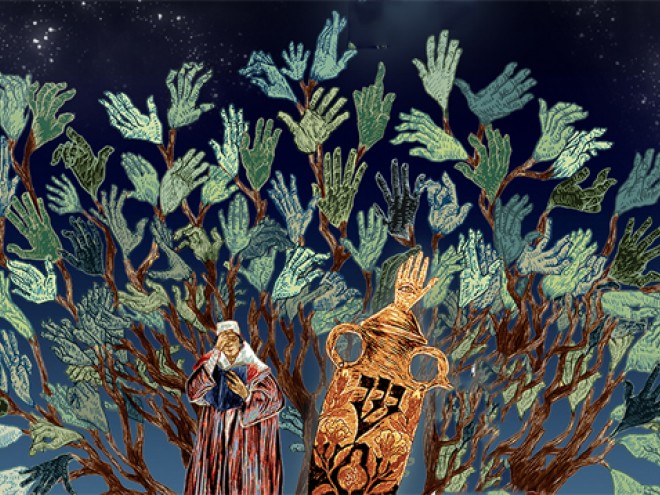
Illustration by Vali Mintzi (detail), excerpted from Osnat and Her Dove: The True Story of the World’s First Female Rabbi by Sigal Samuel
When I was a preteen girl, I had a secret dream of becoming a rabbi. I loved Jewish texts. I loved teaching and helping people. But growing up in the Orthodox community, I almost never saw a leader who was a woman. And even when I did, she never looked like me or my Iraqi family.
When I looked in the mirror, it was the dark curls, dark skin, and dark eyes of Iraq that I saw. The few female rabbis I knew of were Ashkenazi women in the Reform, Reconstructionist, or Conservative movements. I thought: Maybe being a rabbi is something they can do. But me, an Orthodox Mizrahi girl? It’s just not possible.
I had no idea the first girl in the world ever to become a rabbi was Orthodox and Mizrahi just like me: Osnat Barzani.
Osnat was a Kurdish girl born in 1590 in Mosul — just a few hours away from my family’s hometown of Baghdad. She was the daughter of Rabbi Samuel Barzani, a venerated authority who led the Mosul yeshiva. If Rabbi Barzani had any sons, he probably would have taught them Torah, Talmud, Midrash, and Kabbalah. Instead, he had one brilliant daughter. So he taught all that to her.
In a letter, Osnat described her childhood: “I never left the entrance to my house or went outside; I was like a princess of Israel.… I grew up on the laps of scholars, anchored to my father of blessed memory. I was never taught any work but sacred study.”
When Osnat was old enough to marry, her father did something incredible: He made her prospective husband promise to excuse her from doing household chores so she could focus on studying. Jacob, the brightest student at the Mosul yeshiva, agreed to the terms.
When Osnat’s father passed away, Jacob took over as head of the yeshiva. But soon enough, he passed away, too. Osnat knew someone had to teach all the young rabbinical students. So, even though no woman in the world had ever done this before, she waltzed into the school and announced that she would be the new Rosh Yeshiva, the new leader.
Even though no woman in the world had ever done this before, she waltzed into the school and announced that she would be the new Rosh Yeshiva, the new leader.
Amazingly, this did not prove controversial. Osnat was already such a respected scholar in her own right that people didn’t see her gender as an issue. In fact, they started calling her Tanna’it, the female form of Tanna, a name usually reserved for the grand rabbinic sages in the Talmud. Some of Osnat’s contemporaries called her Rabbi. I was touched when I saw the letter that one Rabbi Pinchas Hariri wrote to Osnat, beginning with the salutation, “My Mother, my Rabbi.” I had never seen those two words in juxtaposition before.
I stumbled upon all this information a few years ago when I was doing research for a stage play featuring Jewish female historical figures. I’d gone down a deep internet rabbit hole where, at around 2:00 a.m., I found an article about Osnat by the scholar Renee Levine Melammed. It blew my mind.
I’d previously thought the first female rabbi was Berlin-born Regina Jonas, who served in a rabbinical role before being killed in Auschwitz in 1944. I’d been wrong.
Now that I knew that Osnat had blazed the trail hundreds of years earlier, I figured there must be several books about her. Wrong again. Although there are a few scholarly articles and chapters, there are no books at all about this pioneering woman.

Illustration by Vali Mintzi, excerpted from Osnat and Her Dove: The True Story of the World’s First Female Rabbi by Sigal Samuel
That seemed wild to me, though in a way it made sense: Mizrahi history has often been sidelined. The Jewish history that’s taught in schools is almost always Ashkenazi history. If not for the Kurdish people who preserved some of Osnat’s artifacts and filled their amulets with folktales about her, Osnat’s story might have been lost entirely.
But I don’t want her story to be lost. I want young people to know that this brilliant woman became a leader against all odds way back in the 1600s. Because if she can do it, they can, too.
If I had had a book about Osnat when I was a kid — if I had seen someone like me positively represented in literature — it might have made all the difference. I hope that my new picture book, Osnat and Her Dove, will make that difference for young readers today.
Sigal Samuel is a Staff Writer for Vox’s “Future Perfect.” She writes about artificial intelligence, neuroscience, ethics, and the intersection of technology and religion. Previously, she was the Religion Editor at The Atlantic. Her award-winning journalism has also been published in outlets like BuzzFeed, The Daily Beast, The Rumpus, and Electric Literature. She has appeared on NPR, BBC, and CBC. Sigal’s novel, The Mystics of Mile End, tells the story of a dysfunctional family dealing with mysticism, madness, and mathematics in Montreal. It was nominated for the International Dublin Literary Award and won a Canadian Jewish Literary Award. Sigal earned her MFA in Creative Writing from the University of British Columbia and her BA in Philosophy from McGill University.


